Not all those who wander are lost.
The Fellowship of the Ring (Book I, Chapter 10: Strider)
The list of British writers, poets, novelists, essayist or story writer is almost endless and the amount of plays, poems, novels, biographies, tales, essays, prose and verse that they have published through the centuries is probably beyond our imagination.

Top 10 Famous English Poets
- William Shakespeare (1564–1616) – The Bard of Avon; playwright and poet; author of 154 sonnets and timeless verse.
- Geoffrey Chaucer (1343–1400) – The “Father of English Literature,” best known for The Canterbury Tales.
- John Milton (1608–1674) – Author of Paradise Lost, a master of epic poetry.
- William Blake (1757–1827) – Visionary Romantic poet and artist, creator of Songs of Innocence and Experience.
- William Wordsworth (1770–1850) – Central figure of Romanticism; author of The Prelude and co-author of Lyrical Ballads.
- Samuel Taylor Coleridge (1772–1834) – Romantic poet; wrote The Rime of the Ancient Mariner and Kubla Khan.
- Lord Byron (1788–1824) – Charismatic Romantic poet; known for Childe Harold’s Pilgrimage and Don Juan.
- Percy Bysshe Shelley (1792–1822) – Radical Romantic voice; author of Ode to the West Wind and Prometheus Unbound.
- John Keats (1795–1821) – Celebrated for his odes (To Autumn, Ode on a Grecian Urn) and sensuous imagery.
- Robert Burns (1759–1796) – Scotland’s national poet; lyricist of Auld Lang Syne and A Man’s a Man for A’ That.
World Poetry Day is celebrated annually on March 21st. This day was established by the United Nations Educational, Scientific and Cultural Organization (UNESCO) to promote the reading, writing, and appreciation of poetry worldwide.
Willian Shakespeare, Father of English Literature
Maybe the most famous author of all English literature, Shakespeare was a poet, playwright and actor. He is still regarded today as the world's most eminent dramatist. While he is mainly known by the public for his numerous theatre plays, among which Romeo And Juliet, the most famous romantic tragedy of all times, has been adapted countless times, both for the theatre, Broadway or Hollywood. Shakespeare's plays are still performed today all around the world, and at any given time of the year, it is not surprising to find more than one of his plays being acted on the stage of London's theatres. What the public might not know as much are Shakespeare's sonnets and narrative poems.
Willian Shakespeare's Best Quotes
From Plays
- "To be, or not to be: that is the question:" Hamlet (Act 3, Scene 1)
- "All the world's a stage, and all the men and women merely players; They have their exits and their entrances; And one man in his time plays many parts." As You Like It (Act 2, Scene 7)
- "A horse! a horse! my kingdom for a horse!" Richard III (Act 5, Scene 4)
- "Good night, good night! parting is such sweet sorrow, That I shall say good night till it be morrow." Romeo and Juliet (Act 2, Scene 2)
- "The better part of Valour is Discretion." Henry IV, Part 1 (Act 5, Scene 4)
- "The course of true love never did run smooth." A Midsummer Night's Dream (Act 1, Scene 1)
- "Cowards die many times before their deaths; The valiant never taste of death but once." Julius Caesar (Act 2, Scene 2)
- "If music be the food of love, play on;" Twelfth Night (Act 1, Scene 1)
- "Brevity is the soul of wit." Hamlet (Act 2, Scene 2)
- "Some are born great, some achieve greatness, and some have greatness thrust upon them." Twelfth Night (Act 2, Scene 5)
From Sonnets
- "Shall I compare thee to a summer's day? Thou art more lovely and more temperate:"Sonnet 18
- "Let me not to the marriage of true minds admit impediments. Love is not love which alters when it alteration finds, or bends with the remover to remove:"Sonnet 116
- "My mistress' eyes are nothing like the sun; Coral is far more red than her lips' red:" Sonnet 130
- "When, in disgrace with fortune and men's eyes, I all alone beweep my outcast state,"Sonnet 29
Published in 1609, towards the end of his life, Shakespeare's 154 sonnets were probably never meant to be released and the order they have been printed in most likely did not reflect their actual chronology nor the author's wishes.
Shall I compare thee to a summer's day?
Thou art more lovely and more temperate:
Rough winds do shake the darling buds of May,
And summer's lease hath all too short a date:
Sometimes too hot the eye of heaven shines,
And often is his gold complexion dimm'd;
And every fair from fair sometime declines,
By chance, or nature's changing course, untrimm'd;
But thy eternal summer shall not fade
Nor lose possession of that fair thou ow'st;
Nor shall Death brag thou wander'st in his shade,
When in eternal lines to time thou grow'st;
So long as men can breathe or eyes can see,
So long lives this, and this gives life to thee.
William Shakespeare's most famous sonnet, Sonnet 18
Elizabeth Barrett Browning, The Romantic Poetess
Born in 1806, Elizabeth Barrett started to write poetry from the early age of 6 years old. Her mother collected her poems, which became the most extensive surviving collection of juvenile writing by any English writer, ever. Barrett suffered poor health for most of her life and possibly had tuberculosis. It did not stop her writing, and she published her first collection of poems at the age of 32 years old.
Her poetry was very well received, and she wrote profusely in the following years. She also actively campaigned against slavery and influenced the reforms of child labour legislation. Her work also caught the attention of another poet, Robert Browning, who after writing to her, began to court her secretly.
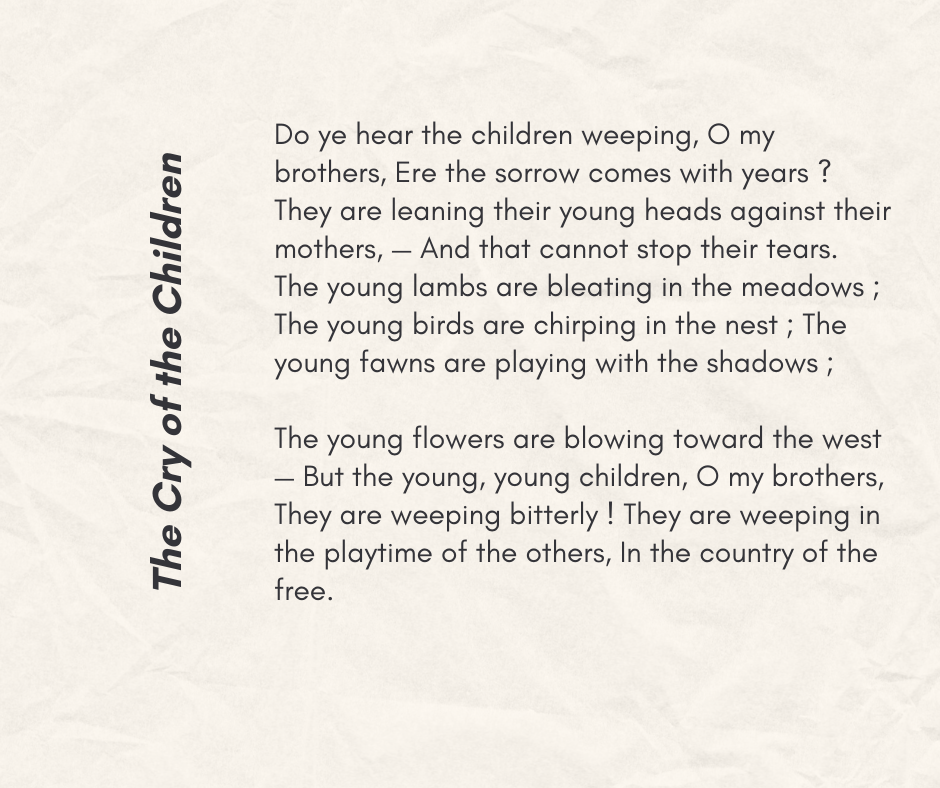
Knowing that her father would disapprove, Elizabeth Barrett and Robert Browing married in secret in 1846 before moving to Italy where they lived happily for the rest of their lives. This love union fuelled many of her love poems and creativity in her writing. Barrett Browning's poetry is celebrated for its lyricism, emotional depth, and exploration of themes such as love, faith, social justice, and the role of women in society.
Despite her health challenges, Barrett began writing poetry from a young age and published her first collection, "An Essay on Mind, with Other Poems," in 1826.
The work of Elizabeth Barrett Browning was a famous poet that had a great influence on some of her famous contemporary writers among which Edgar Allan Poe and Emily Dickinson.
How do I love thee? Let me count the ways.
I love thee to the depth and breadth and height
My soul can reach when feeling out of sight
For the ends of Being and ideal Grace.
I love thee to the level of every day's
Most quiet need, by sun and candlelight.
I love thee freely, as men strive for Right;
I love thee purely, as they turn from Praise.
I love thee with the passion put to use
In my old griefs, and with my childhood's faith.
I love thee with a love I seemed to lose
With my lost saints,—I love thee with the breath,
Smiles, tears, of all my life!—and, if God choose,
I shall but love thee better after death.
Elizabeth Barrett Browning's "Sonnets from the Portuguese" is a beautiful collection of love poems, and Sonnet 43 is one of her most famous and cherished works. It expresses the depth and intensity of the speaker's love for the subject.

Robert Burns, The Bard Of Ayrshire
Celebrated as the most significant Scottish writer of all time, the popularity of Burns throughout all of Scotland and with the Scottish diaspora all over the world, made him the subject of a real personality cult during the 19th and 20th centuries. Still today, Burns supper, a national holiday in Scotland, is more celebrated than the actual National Day of St. Andrew's.
He popularised the use of the Scots language in literature, though most of his work was written in English. His direct, sincere and straightforward style, approaching many serious subjects such as equalitarianism, anticlericalism, or Scottish nationalism, had a significant influence on many British poets and writers such as William Wordsworth, Samuel Taylor Coleridge, Percy Bysshe Shelley, Allan Ramsay, Robert Fergusson or Hugh MacDiarmid but also had a profound impact on the future founders of socialism and liberalism.
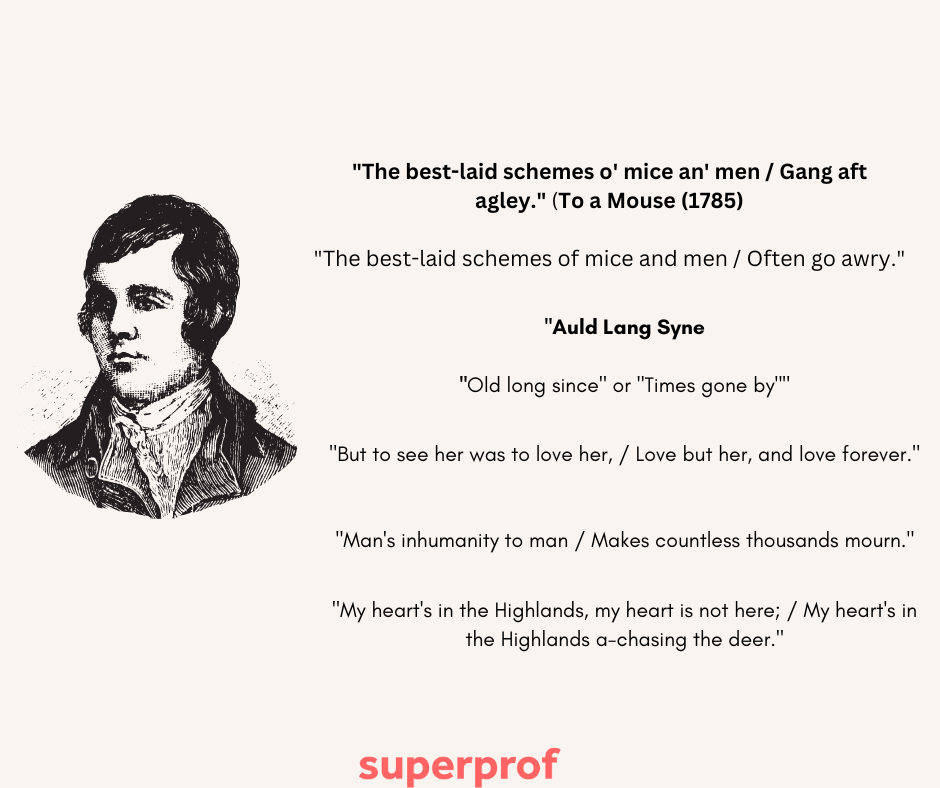
Some of his most famous work was inspired by the French Revolution which unfolded when Burns was about 30 years old. Coming from a family of poor tenant farmers, his point of view is far from being the one of the bourgeoisie but is close to the mass of the oppressed.
A firm believer that the poor of humankind will one day come to realize their "sense and worth" and unite against the oppression of the elites, though this part of his work and philosophy is often left aside.
Burns' poetry had a significant impact on Scottish literature and culture, and he remains a beloved figure in Scotland and beyond. He is commemorated annually on January 25th, known as Burns Night, with celebrations including Burns Suppers featuring haggis, whisky, and recitations of his poetry.
Dylan Thomas, Poetry and Radio
Probably the most famous of Welsh poets, Dylan Thomas became known to the British public through his poetry programs broadcasted by BBC Radio. Born in 1914 in Swansea into a middle-class family, Thomas started writing poetry when he was only 15 years old, and in the following four years, while working as a freelance journalist, he amassed more than 200 poems compiled in four books.
His publications in The New English Weekly and The Listener caught the attention of three major writers of the time, T. S. Eliot, Geoffrey Grigson and Stephen Spender. They helped launch his career, and in 1934 when Thomas was only 20 years old, his first poetry book was published under the title 18 Poems.
The Listener newspaper belongs to the British Broadcasting Corporation (BBC), established his connections with the network which would later bring his poems into the homes of millions of Britons.
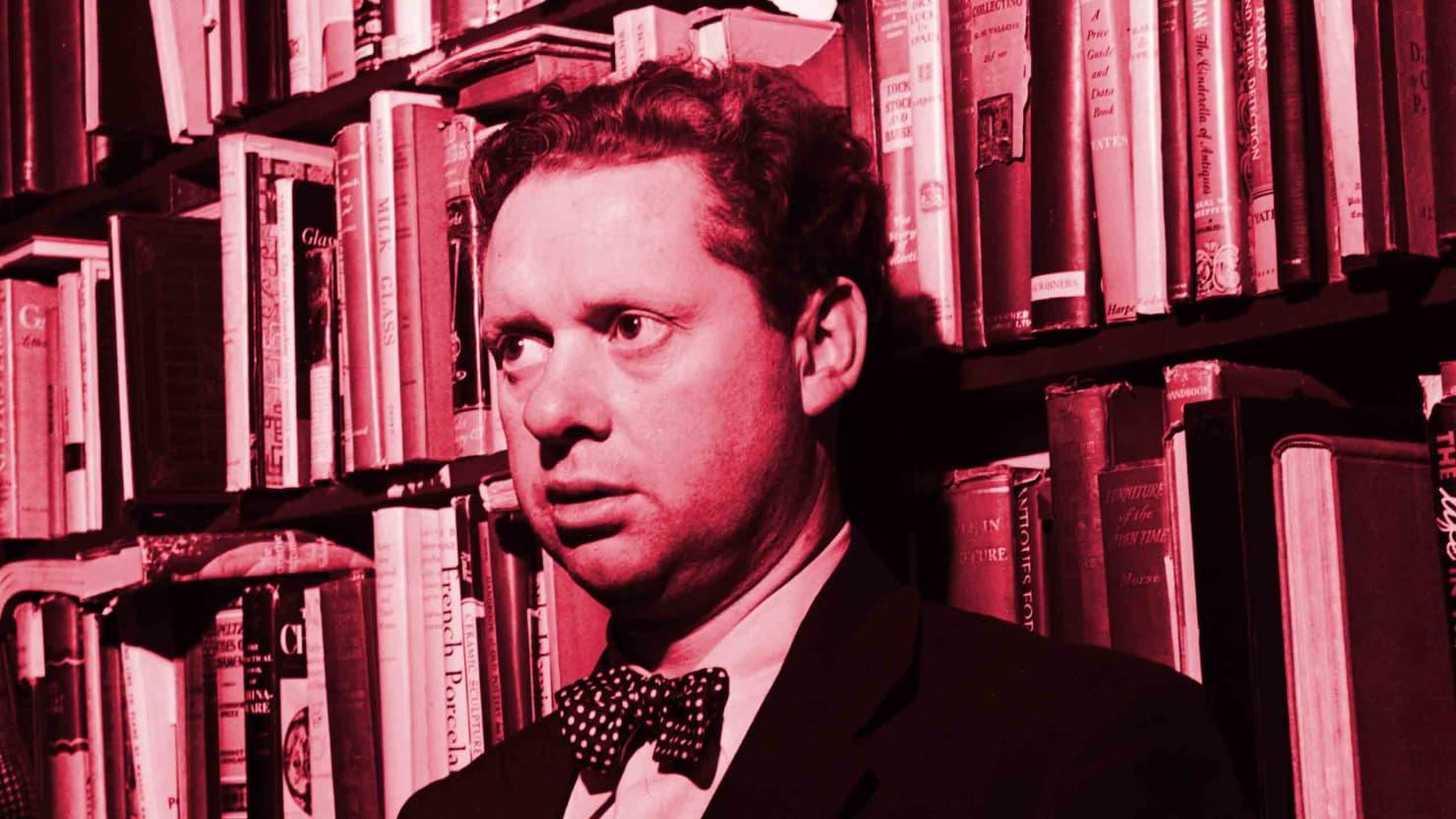
And death shall have no dominion.
Dead men naked they shall be one
With the man in the wind and the west moon;
When their bones are picked clean and the clean bones gone,
They shall have stars at elbow and foot;
Though they go mad they shall be sane,
Though they sink through the sea they shall rise again;
Though lovers be lost love shall not;
And death shall have no dominion.
- Dylan Thomas, And Death Shall Have No Dominion
J.R.R. Tolkien, The Linguist Poet
"I wish it need not have happened in my time," said Frodo. "So do I," said Gandalf, "and so do all who live to see such times. But that is not for them to decide. All we have to decide is what to do with the time that is given us."
The Fellowship of the Ring (Book I, Chapter 2: The Shadow of the Past)
John Ronald Reuel Tolkien is mostly known for his books, later adapted to cinema, The Lord of The Rings and The Hobbit. Both these books are amongst the best selling novels ever written and combined; it is estimated that around 250 million copies were sold, making Tolkien one of the most successful authors of all times.
While Tolkien is most famous for his fantasy writings, most Britons ignore that he was also a talented poet.
His work as a linguist made him an expert in manipulating words' aesthetics and euphony. He also created two entirely new languages, an exhaustive work that probably explains why his academic research at Oxford University remained so thin.
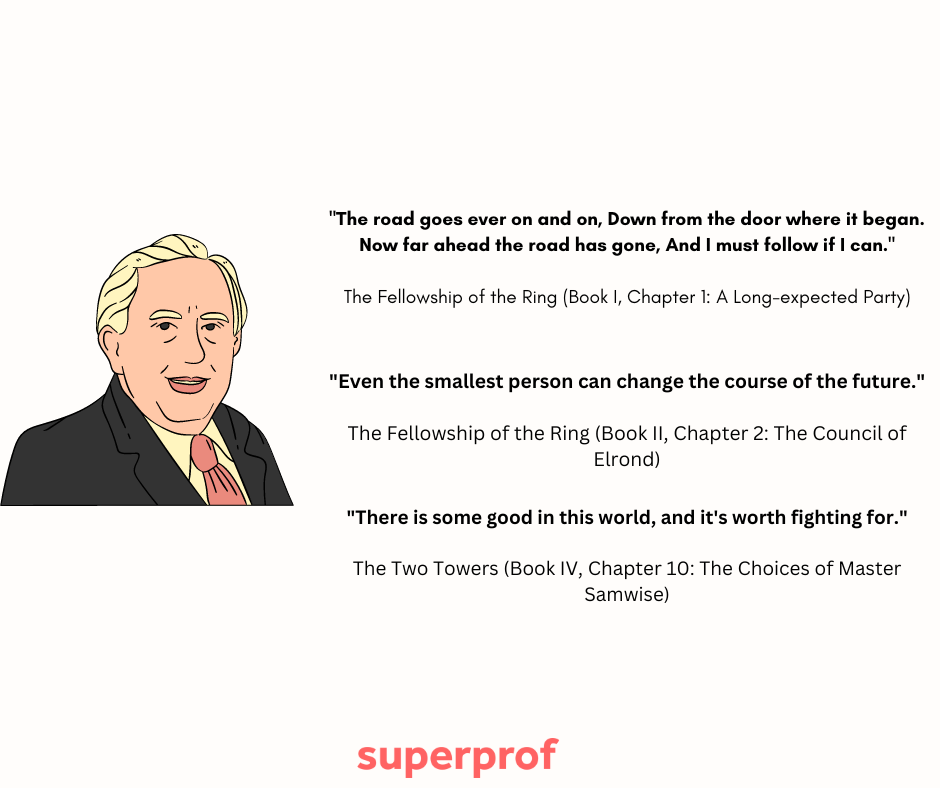
Some of his poems have been included in his fantasy work, and one of the most famous ones is part of The Lord Of The Rings and is titled All that is Gold Does Not Glitter. The poem was there to warn readers that Aragorn, one of the main characters in the book, is far more important than it seems.
All that is gold does not glitter,
Not all those who wander are lost;
The old that is strong does not wither,
Deep roots are not reached by the frost.
- J.R.R. Tolkien, All that is gold does not glitter
How To Write a Poem in English?
Writing a poem in English, like writing poetry in any language, can be a highly creative and personal process. Here are some steps to help you get started:
- Choose a Theme or Topic: Begin by selecting a theme, topic, or emotion you want to explore in your poem. It could be about love, nature, a personal experience, or any other subject that inspires you.
- Select a Form: Decide on the form or structure for your poem. There are various traditional forms like sonnets, haikus, and limericks, or you can opt for free verse, which doesn't follow a specific structure.
- Create an Outline: Outline the main ideas or points you want to convey in your poem. This will help you organize your thoughts and give your poem a clear direction.
- Use Imagery and Figurative Language: Poetry often relies on vivid imagery and figurative language, such as metaphors, similes, and symbolism. These elements help create a more expressive and engaging poem.
- Play with Sound: Pay attention to the sound of your poem. Use rhyme, alliteration, assonance, and rhythm to create musicality and flow in your verses.
- Start Writing: Begin writing your poem. Don't worry too much about getting it perfect in the first draft. The important thing is to get your thoughts and emotions down on paper.
- Edit and Revise: After you've written your initial draft, go back and revise. Consider the choice of words, the structure, and the flow of the poem. Make sure each line serves a purpose and contributes to the overall theme.
- Get Feedback: Share your poem with others, whether it's friends, family, or writing groups. Constructive feedback can help you improve your work.
- Read and Learn: Read widely. Exposure to different styles and voices will help you improve your poetry. Learn from established poets and understand the various techniques they use.
- Practice: Like any form of writing, practice is essential. Keep writing, experimenting with different styles and subjects. Over time, you'll develop your unique voice and style.
Remember that writing poetry is a deeply personal and artistic endeavor. There are no strict rules, and your individuality and creativity should shine through in your work. Don't be afraid to take risks, and most importantly, enjoy the process of expressing yourself through poetry.
Summarise with AI:

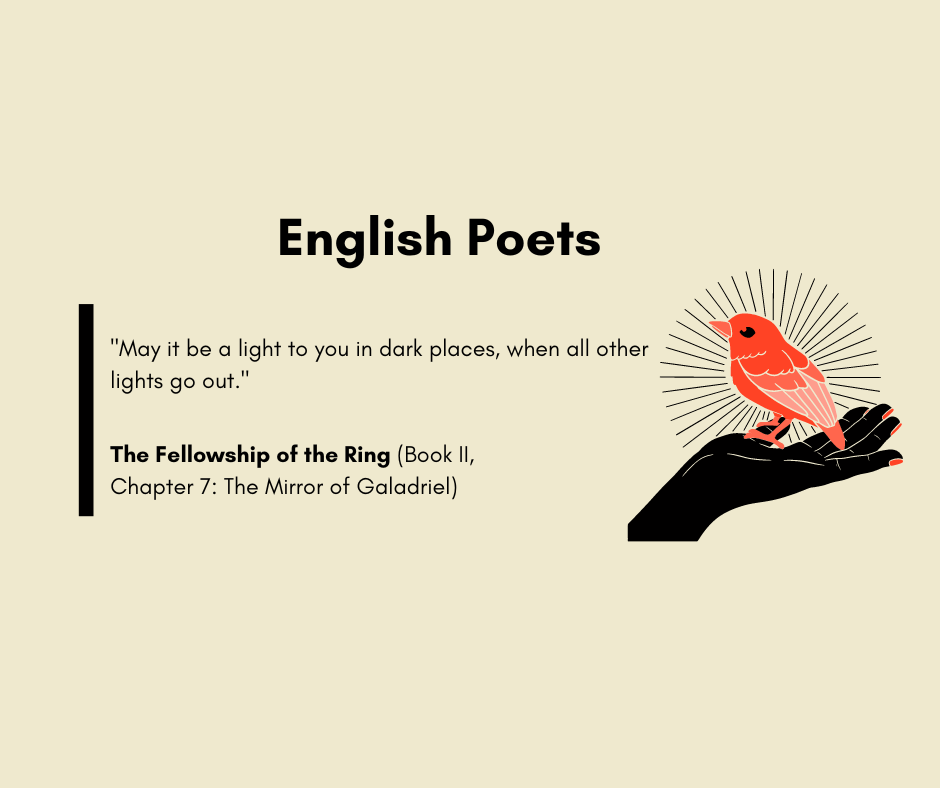














I am indian book reader and reviewer
I have wish to read William Wordsworth
Biography